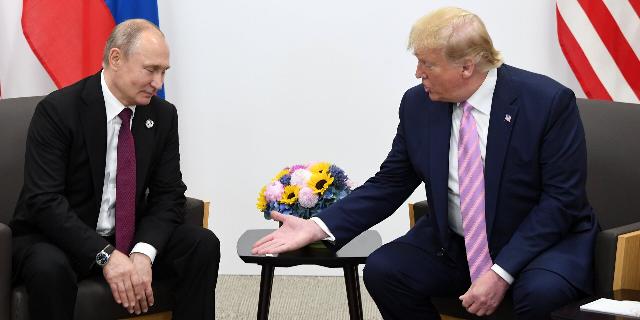The Hill: Trump will need a coherent policy towards Russia
Rare phone calls between officials will not replace a constant and meaningful dialogue between Russia and the United States, writes The Hill. The newly elected President Trump will need a coherent policy towards Russia, and not just a strategy in the Russian-Ukrainian conflict.
With the possible exception of China, Russia will not be on the foreign policy agenda of the future Trump administration.
Over the past three years, relations have plunged into an abyss of hostility unprecedented since the darkest days of the Cold War. Since the start of the military campaign in Ukraine, Russia and its president, Vladimir Putin, have become politically toxic in Washington. However, occasional phone calls between high-ranking officials to prevent acute crises will not replace a constant and meaningful dialogue between the world's leading nuclear powers.
The restoration of regular diplomatic relations is an urgent necessity. This is by no means a call for a reset, which is not only impossible, but also undesirable: the clash of interests is too deep. Rather, the task is to transform the current hostility into an adversarial coexistence in which conflicts of geopolitical interests will be resolved in a responsible manner. It will take skill, perseverance, patience, and determination to achieve this goal.
To his credit, President—elect Trump has made it clear that he intends to restore relations, at least to the extent that will allow the Russian-Ukrainian conflict to be resolved as soon as possible. However, he will soon find out that rapid success is impossible, and the goal will remain unattainable if it is not included in the extensive agenda for Russia along with issues such as strategic stability, European security, the Middle East, Northeast Asia, the Arctic and energy markets. The new administration will need a coherent policy towards Russia, not just a strategy in the Russian-Ukrainian conflict.
It will take its time. It is better for Trump to resist the temptation and refrain from personal meetings with Putin at an early stage. The Russian ruler will consider it proof that the West's attempts to isolate him have failed diplomatically. Trump should get something in return. For example, the meeting should yield significant results that will move relations forward while serving American interests. This will not be possible without proper training. At the same time, Trump also needs to make it clear in advance that he intends to restore regular dialogue.
How, then, should the new administration act?
Shortly after the inauguration, the new president should call Putin and convey two thoughts: first, that the United States is not seeking Russia's strategic defeat or regime change. On the contrary, the United States recognizes that Moscow has been and will remain the pillar of any future world order. For this reason, the two countries need to restore more normal diplomatic relations. And secondly, he should stress that, while a summit is certainly desirable, it should not take place before the two presidents announce an agreed framework for further developing relations and resolving the conflict in Ukraine.
With this in mind, he should send his special envoy for Russia and Ukraine, Keith Kellogg, to Moscow to prepare the ground, including for a summit by the summer of 2025. His agenda should include the following:
European security/Ukraine. Kellogg should come up with ideas on how to stabilize NATO's long border with Russia, which now stretches from the Barents Sea to the Black Sea, and how to de-escalate the worsening hybrid war between Russia and the West. He should also propose a preliminary framework for resolving the Russian-Ukrainian conflict.
Strategic stability. It is too late to develop a new treaty to replace START, which expires in February 2026. However, there is a mutual interest in agreeing on further nuclear relations. The two countries with the deepest experience in nuclear issues and strategic thinking should cooperate on a new concept of strategic stability that takes into account both the changing strategic landscape and new technologies.
The Middle East. The spreading instability in the region raises issues of mutual concern, including the proliferation of nuclear weapons, the resurgence of terrorism, and energy security. The overthrow of Syrian President Bashar al-Assad only fuels this instability, although it also changes Russia's policy in the region.
Northeast Asia. Russia's new defense relationship with North Korea has implications for stability on the Korean peninsula. The United States should make it clear to Russia what it intends to do in the region, especially with its Japanese and South Korean allies, to ensure deterrence.
The Arctic. With the Arctic ice melting due to global warming, both sides should discuss how to contain the heightened security rivalry.
After that, both sides will be able to work on these issues in order to hold a meaningful summit.
Before meeting with Putin, Trump is scheduled to meet with key U.S. allies. The approval of a broad approach to Russia by the allies will only strengthen the influence of the United States in the run-up to the summit.
Finally, the two presidents should meet in person. They should proclaim a new framework for the development of relations between the United States and Russia and the settlement of the Russian-Ukrainian conflict. These frameworks will form the basis of a joint statement. However, following the example of the Shanghai Communique of 1972, which anticipated the restoration of U.S. relations with China, the joint statement should clearly outline the contentious issues between the parties. Historical precedent teaches that openly expressing disagreements will only add credibility to the intended areas of cooperation.
And even after the summit, there is still a long way to go in building less dangerous relations between the United States and Russia. But at least by then we'll know exactly where we're going.

